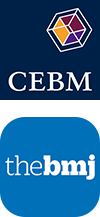




Peter J. Gill
Evidence Live 2016 was a resounding success, bringing together global leaders in evidence-based medicine along with 300 delegates. An important conference theme was Training the Next Generation of Leaders in Applied Evidence which included events targeting Leaders of Tomorrow in Evidence-Based Medicine. The top five trainee submissions were provided free admission to Evidence Live and were published in the Student BMJ. Over 30 delegates attended a networking session to flesh out potential opportunities to create a formalised network of future leaders (more on this in the coming weeks).
But the Future Leadership Showcase, featuring Kamal Mahtani, An-Wen Chan, Howard Bauchner and Hilda Bastian, was one of the most memorable conference sessions. We asked this diverse group of individuals to elaborate on their ‘untold story,’ reflect on pivotal career moments and share pearls of wisdom for early career researchers.
Several years ago, a patient asked Kamal about a new medical device which claimed to lower blood pressure by helping patients control their breathing. Kamal sought to answer the question, was unsatisfied with what he found, and ended up doing a systematic review on the topic. Somewhat to his surprise, Kamal became the national expert on device-guided breathing for hypertension, and his review was widely cited in multiple guidelines.
Kamal’s example reminds us why we conduct clinical research: to resolve unanswered questions for patients. It elaborately illustrates the principles of evidence-based medicine – being sceptical, questioning the scientific literature, and seeking the truth. Kamal concluded his talk with five key things that he learnt from his experience:
An-Wen, a leader in clinical trial quality and chair of the SPIRIT initiative, confessed that his first foray into research was ironically conducting a failed clinical trial. While this may be a surprise to many, it illustrates the ‘untold story’ of failures of many successful researchers. The botched trial led An-Wen to realize that he needed formal training in research methods, and he went on to start a DPhil with Doug Altman at the University of Oxford. Yet, his struggles continued.
An-Wen sought to compare the primary outcomes in published clinical trials with the primary outcome submitted to research ethics committees. Two years into his DPhil, due to various road blocks, he had no data. But, An-Wen persisted and eventually, thanks to (Peter Gotzsche, got access to submissions in Denmark which turned out to be a better dataset. An-Wen explained the importance of resiliency: ideal plans often fail but more often than not a silver lining emerges. An-Wen’s closing comment is worth repeating: rather than work on documenting problems, help find solutions. For example, he is currently working on creating an online tool to help researchers draft trial protocols.
Howard Bauchner, editor-in-chief of JAMA, emphasized the importance of having both research and career mentors. Research mentors provide guidance and support during a research project or thesis (i.e. help select proper methodology, assist to find funding, etc.). Career mentors, on the other hand, assist mentees in making broader career or life decisions (i.e. whether one should move to another city or pursue specialty training). While one mentor can provide both functions, Howard advises having multiple mentors. Career mentors are not necessarily in your discipline either; they are like life coaches.
Howard provided additional pearls of wisdom by drawing on his expertise as an editor. He (not surprisingly) encouraged early academics to volunteer to peer review articles, and to focus on nurturing a relationship with a small number of journals. By regularly reviewing, one can become known to the editorial staff. Once known, Howard boldly suggested asking to join the editorial board. Why not?
Hilda closed the session with a heartfelt reflection of her career journey, leaving the audience contemplative. Throughout her career, Hilda chose to follow a path based on what she felt was most important, which led her into consumer advocacy. She challenged the audience to ask oneself what success is defined as. It can be tempting to pursue a path that will lead to ‘academic success’ but to what end? Find out what engages you, and passionately pursue this topic or idea.
Hilda poignantly ended her talk reflecting on failure. While it may seem that successful academics brush off failure (or never experience it), in reality, everyone struggles with failure. But, what defines each of us is how we cope with failure. It is important to get up off the ground, and try again. Hilda reminded us that we are not alone: seek help and support, and in doing so, learn how others have dealt with failure.
In short: learn from patients, get formal research training, conduct a systematic review, peer review for journals, seek out mentors, and be persistent. Failure is intrinsically a part of taking risks, but is accompanied by resiliency, wisdom and personal growth.
—
Peter J Gill is a paediatric resident at The Hospital for Sick Children, University of Toronto and an Honorary fellow at the Centre for Evidence-Based Medicine, University of Oxford. He is a member of the Evidence Live steering committee which includes a Future Leaders initiative.
You can follow him on Twitter at @peterjgill
Competing interests: I have read and understood BMJ policy on competing interests. I have no other competing interests to declare.
Disclaimer: The views expressed are those of the author and not necessarily of any of the institutions or organisations mentioned in the article.
DOI: 10.13140/RG.2.1.3892.3769